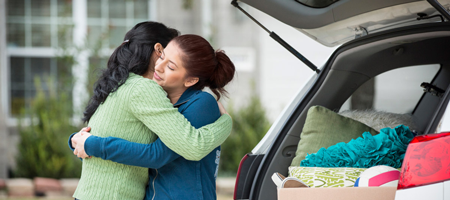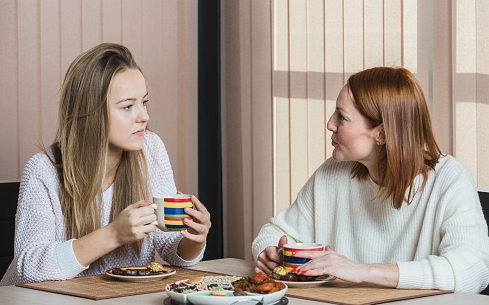The overall goal of a residential treatment center is to help teens develop appropriate coping skills to sustain their mental health and lead an enjoyable and healthy life. While in a residential therapy program, teens will receive the tools necessary to pursue their own personal goals.
After concluding a residential therapy program, teens have to implement these essentials to their daily routines. Returning to their normal responsibilities, relationships, and environments require adjustment.
In addition, This is especially true after experiencing and adapting to the structure and constant support of a residential treatment facility.
It is completely natural for teens to undergo hardships with the stress of returning home from residential treatment. However, there are plenty of available resources to make this transition easier for teens and for their families.
Research has shown that after-care is one of the leading tools impacting teen mental health recovery. There are a variety of options when looking into after-care.
For example, Day-Long Programs give teens support they might need during the day, yet still allow them to begin adjusting back to their home environments in the evening.
Many residential treatment programs integrate after-care into their treatment layouts.
When teen returns back home after residential treatment, their families will most often have questions and concerns about how they can best assist them in transitioning back to life outside of a teen treatment center.
These six tips can help family members and parents help their teens, and more importantly help the teens to implement the lessons they learned in treatment and readapt to home life after their rehab. Additionally, these tips will help the entire family function more peacefully.
1. Understanding that recovery is an ongoing process
Residential treatment centers for teenage depression, troubled youth programs, teen alcohol treatment, and teen drug rehab have an agreed upon goal to help troubled teens address the underlying causes of their self-destructive behavior. The goal is for adolescents to develop self-awareness and better-coping skills.
Although troubled teen programs can help teens make drastic changes, after-care is still necessary to help them transition properly and in such a way that is beneficial to them and their future. After-care resources can help the teen maintain the positive habits learned during treatment. This may include a variety of resources focused on providing social, academic and psychological support.
2. Research resources before-hand
Parents should explore any mental health resources that are available within their community before committing to a residential treatment. Teens will be more committed to their after-care if they have involvement in choosing their after-care treatment strategies.
However, it may be time-consuming to target the exact program that best fits your teen. Therefore, knowing what resources are available will help speed up the process.
Research has shown that, after attending a teen rehab center, teenagers have much more success at curving relapse when they are enrolled and attending Alcoholics Anonymous or Narcotics Anonymous meetings. After-care may also include support such as tutoring, individual or family therapy, and mentorship programs. These resources are designed specifically to help parents adjust to their teen being home and also with helping the teen adapt to transitioning back to life prior to treatment.
3. Provide structure
The direct and consistent structure of a residential mental health program helps teens take back the control in their lives. It also provides stability as they obtain new emotional coping skills.
However, when teens begin the transition back home after rehab, the shift from a structured schedule to relative freedom and independence can often be shocking. Not to mention, as its common in many cases, coming home can trigger those familiar emotional challenges.
It is critical for parents to provide stability after youth transition home, while at the same time respecting their boundaries. By working with your teen to develop a plan for their ongoing therapy, academic expectations, and responsibilities at home you can help them create a roadmap for success.
4. Be present
Residential programs work in family involvement in their treatment models to repair and maintain the family’s dynamic.
However, There will times where it may be difficult for families to reconnect and build that bond back. Especially when the family has been strained by a teen’s emotional challenges and by the time they were away in a residential treatment.
When building a plan to maintain and provide a structured stable environment, parents should also be mindful of allowing space for teen’s spontaneity.
Parents have a broad variety of options after their teen is transitioning home to show support and dedication to their recovery. Simple things such as randomly sending a text message, take an outdoor adventure, or simply sitting down to talk, or watch TV together can help your teen feel loved and noticed while contributing to a sense of normal life.
5. Prepare for minor setbacks
During the transition back to your teen’s daily routines after a residential treatment facility, they may begin to struggle to avoid relapse and/or familiar emotional triggers.
The stress of these changing environments may cause teens to return to harmful behaviors. Therefore, parents must be prepared to help teens adjust, with understanding and support.
Do your best not to be discouraged, and understand that minor setbacks are not an indication that treatment was ineffective. Instead, these setbacks are a normal part of the transition process as teens learn to manage their mental health more independently.
6. Establish trust and respect
In order for parents to contribute as an active role in their teen’s mental health, they must first have their teen’s respect. This way they can learn about what is going on in their teen’s life without prying or violating their personal privacy.
One of the best ways to earn your teens trust is to establish mutual respect. Once a teen has learned skills to manage their mental health independently, parents can continue to support their growing process by listening to and valuing their opinions.
Involve teens in family decisions and communicate openly and respectfully. Parents need to make it clear that they care about their teen’s views and opinions and trust their judgment.
Finally, a teen’s return home after residential treatment is an exciting yet challenging time. Knowing what to expect and being prepared with resources and a plan can help smooth the transition for the whole family.


